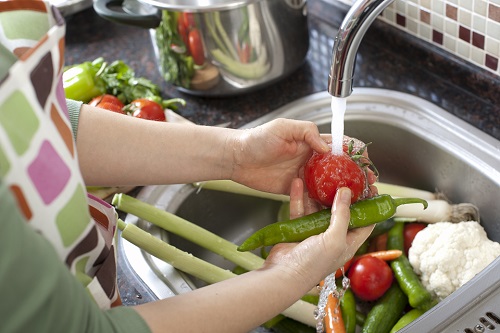What to Eat after Kidney Transplant, Part 1

People with chronic kidney disease (CKD) and patients on dialysis must follow a special diet. But what happens after a kidney transplant? Is a special diet still needed? The short answer is yes, but it is often less restrictive than a CKD or dialysis diet.
Acute Post-Transplant Phase Nutrition
The acute transplant phase is the period of time right after the kidney transplant. It can last up to eight weeks. During this time, protein and calorie needs are increased due to medications taken after transplant, such as corticosteroids, and postoperative stress.1
Blood glucose levels can become elevated during this time.1 Glucose intolerance is common and can increase a person’s risk for pre-diabetes or diabetes after a kidney transplant. Uncontrolled blood glucose levels may be associated with graft loss (transplant failing), infection and cardiovascular disease. It is important to manage high glucose with a carbohydrate-controlled diet and exercise, along with insulin or oral medications if prescribed.
Fluid and sodium restrictions are individualized. Most people do not have to limit how much they drink. Some of the transplant medicines, such as steroids, can cause the body to retain fluid.2 In this case, monitoring how much salt you consume is still important. It is recommended to limit high-salt foods, including table salt, sausage, ham, pre-packaged frozen dinners and canned soups.
Potassium usually does not need to be restricted after transplant. However, some of the transplant medicines can cause potassium levels to increase while others can make it decrease.1,2 The transplant team will monitor potassium levels and they will provide education on the amount of high potassium foods to eat.
Phosphorus levels often drop low post-transplant, so restriction is not needed.1 The high-phosphorus foods limited while on dialysis can now be enjoyed. In some cases, dietary sources of phosphorus are not enough to increase phosphorus to a normal level and a phosphorus supplement is needed. CKD may cause bone loss and the corticosteroids taken after a transplant may cause further bone loss. Adequate calcium and vitamin D intake is crucial to keep bones healthy. It is recommended to include two servings of dairy daily, such as low fat milk, cheese and yogurt.2 The transplant team may recommend a calcium and vitamin D supplement.
Food Safety
Transplant patients take immunosuppressive medications to prevent rejection of the new kidney. As a result, they are at higher risk for food borne illness due to their decreased immune function from these medications.3 Foods that pose a high risk for contracting a food borne illness and should be avoided include:
- Raw or undercooked eggs
- Raw or undercooked pork, beef, chicken, fish, shellfish (sushi)
- Unwashed raw fruits or vegetables
- Unpasteurized milk, cheese, yogurts
- Sliced deli meats and cheeses (heating deli meats to steaming hot or 165° F can make them safe to eat)4
Proper food handling of all types of foods is crucial to prevent a food borne illness. Tips for proper food handling include:
- Wash hands frequently
- Clean cutting boards
- Use a separate knife for raw meats and produce
- Avoid countertop thawing
- Cook foods thoroughly to the proper internal temperature
- Avoid leaving leftovers at room temperature
References:
- Byham-Gray, L., Stover, J., & Wiesen, K. (2013). A clinical guide to nutrition care in kidney disease. Chicago, IL: Academy of Nutrition and Dietetics.
- Diet and Transplantation. National Kidney Foundation. Accessed 6/25/2020. https://www.kidney.org/atoz/content/nutritrans
- Food Safety is a Must! National Kidney Foundation. Accessed 6/25/2020. https://www.kidney.org/atoz/content/foodsafety
- Food Safety: For Transplant Recipients. U.S. Department of Agriculture: Food and Drug Administration. Revised September 2011. Accessed 7/29/2020. https://www.fda.gov/media/83755/download
Additional Kidney Diet Resources
Visit DaVita.com and explore these diet and nutrition resources:
- DaVita Food Analyzer
- Today’s Kidney Diet Cookbooks
- DaVita Dining Out Guides
- DaVita Kidney-Friendly Recipes
- Diet and Nutrition Articles
- Diet and Nutrition Videos
- Kidney Smart® Virtual Classes
This article is for informational purposes only and is not a substitute for medical advice or treatment. Consult your physician and dietitian regarding your specific diagnosis, treatment, diet and health questions.

Recent Comments